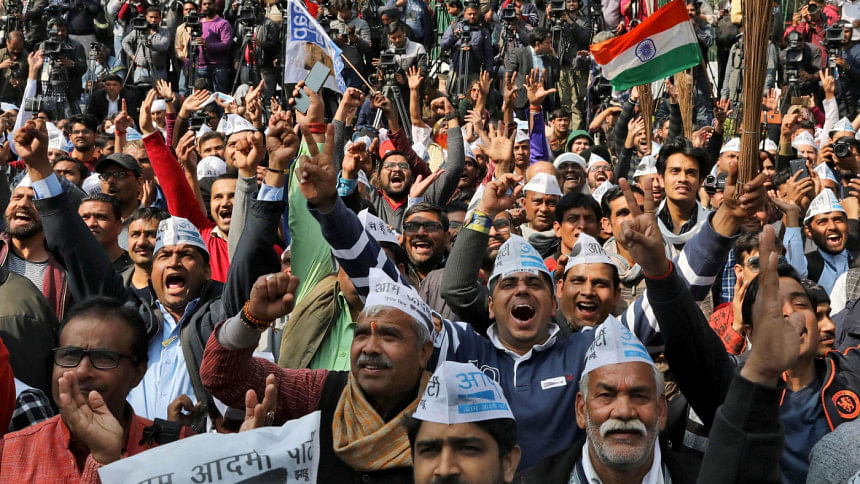A tale of two cities

Activist-turned-politician Arjun Kejriwal has had smooth sailing at the recently held Delhi legislative polls, with his Aam Aadmi Party (AAP) being handed a strong mandate by the Delhiwalas, winning a sweeping 62 out of 70 seats. This is his third straight term in office.
Despite the Bharatiya Janata Party's (BJP) landslide success in the 2019 national elections and Amit Shah's vitriolic campaign for the Legislative Assembly polls promoting the Modi's government's agenda of Hindu nationalism—which has raised important questions about the pluralistic democratic tradition of India—it was Kejriwal who emerged victorious in the February 8 polls. An overwhelming 61 percent of Delhi's 14.7 million eligible voters cast their ballots in the election.
The Delhi polls' voter turnout has been in complete contrast to the number of voters who showed up to cast their ballot in the Dhaka mayoral elections that was held on February 01, 2020. A mere 25.30 percent voters turned up in the Dhaka North City Corporation (DNCC) polls, while a slightly higher proportion of voters—29 percent—showed up in the Dhaka South City Corporation (DSCC) elections.
DNCC saw the re-election of Mayor Atiqul Islam with only 14.84 percent of the total voters, while Sheikh Fazle Noor Taposh managed to get elected with the support of 17.30 percent of the voters. While the figures look bleak and have been blamed on the lack of Dhaka voters' interest in elections, in view of the significant voter participation in Delhi's legislative assembly polls—despite the political and social turmoil that India, especially Delhi, has been plunged into because of BJP's divisive policies, including the NRC and CAA—this apathy of voters towards elections in Dhaka deserve introspection.
For one, the voters in Delhi had something to vote for. Kejriwal, in his last two terms in office, had been very active in addressing the basic needs of the people of Delhi: electricity, water, and sanitation. "AAP government has delivered on certain segments such as providing subsidised electricity and water, improving the condition of government schools and health clinics," said Rahul Verma, a fellow at the Centre for Policy Research, regarding the popularity of Kejriwal's AAP. Ever since Kejriwal came to power in 2015, he made sure to make basic utilities available for the people of his locality, to the point where his victory in the recent polls has been attributed to what the BJP calls "freebies"—free water and power, to be specific. And if Kejriwal could, he would make all the services under his jurisdiction free for the people.
Kejriwal's agriculture policy—his announcement of compensation for damaged crops after his election in 2015—had instantly won the support of the farmers. His ministers and his team worked relentlessly in the rural areas to provide bus services to the people.
Kejriwal's education programme, which included improving government-run schools and the opening of vocational centres for skills training, was also a hit among the people living in the fringes of society. The establishment and running of affordable neighbourhood clinics in Delhi have also hit a resonant chord with the people. After his election victory, Kejriwal said, "It's not just my win. This is a win for every family whose children are now getting good education in schools, whose family members are getting good treatment in hospitals."
In comparison, if we ask what the people of Dhaka had to vote for, the answer would be simple: inaction, lack of foresight and a myriad of city service failures. Case in point: the failure of the two city corporations to tackle the dengue outbreak last year that claimed more than 164 lives, according to official figures. The lacklustre performance of the two city corporations in combating dengue, including the use of ineffective insecticide and a strategy that was completely inadequate, to put it politely, goes on to explain why perhaps the people of Dhaka were not so enthusiastic to participate in the elections.
The constant water-logging woes of the people and illegal parking of vehicles were added elements that show the ineffectiveness of the two city corporations. Rampant illegal grabbing of public properties including public parks, footpaths, and other public places is also a key highlight of the ineffectiveness of the city corporations. The widespread use of plastic lamination for posters that decorated the alleys and streets of Dhaka in the lead up to the elections, as well as the waste of paper during the mayoral election campaign, also diminished the polls. And of course, there were the historic allegations of vote fixing and vote rigging against the Election Commission that put some people off from participating in the polls.
Some might argue that AAP's success in Delhi was possible because the Indian capital is one of the more well-off urban centres where tax collection is among the highest in India. But so is Dhaka. If Kejriwal could beat the nationalist narrative of the powerful BJP to woo the Delhiwalas with his pro-people policies and work, one must wonder, why can't our mayors do the same?
Some questions are deeper than partisan politics. They relate to the fundamental nature of our polity; the democratic fabric that makes up our community. It is easy to take for granted their durability in the face of adversity, but lest we forget, our democratic rights were a hard-fought achievement and not a birth right.
Perhaps our leaders, the same leaders who had so valiantly fought for these rights, cannot sense the slow, insidious erosion of these ideals—perhaps there is no erosion at all. But the numbers reflect a fact that is hard to deny—the silent majority is growing more silent, and becoming even more of a majority. Surely, this cannot be a healthy state of affairs?
Tasneem Tayeb is a columnist for The Daily Star. Her Twitter handle is: @TayebTasneem

 For all latest news, follow The Daily Star's Google News channel.
For all latest news, follow The Daily Star's Google News channel. 



Comments